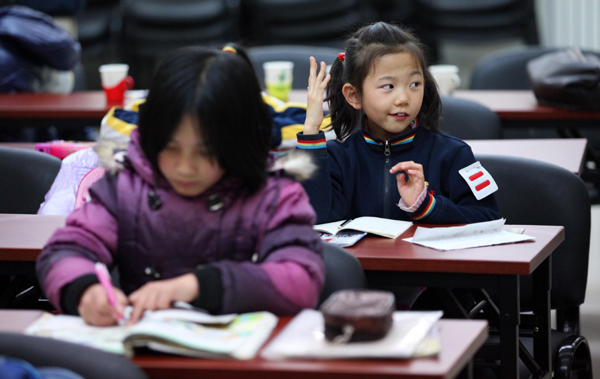Chaoyang authorities to shut down 18 privately operated schools
The education authority in Beijing's Chaoyang district said it will shut down non-government run schools for migrant workers' children to ensure the students receive a better education.
"The policy will guarantee migrant workers' children will enter public schools," Liu Libin, deputy director of the district's education commission, told China Central Television.
 |
|
A girl raises her hand to ask for help in an office of the neighborhood committee of the Anhuili Community in Beijing. The neighborhood committee sets aside one of its offices for the children of migrant workers working near the community after school and arranges volunteers to take care of them before their parents bring them home. [Xue Jun/For China Daily] |
"While keeping to government regulations and principles, we will also take the practical situation into consideration to ensure that all students will be transferred to public schools," he said.
The commission plans to close all 18 schools that cater to migrant workers' children within the next two years, according to China National Radio.
Since 2006, education authorities in the capital have been tightening the management of schools for migrant workers' children by closing those that do not meet the standards set by government.
As greater numbers of migrant workers have moved to large cities since the 1990s, private schools for their children sprung up in Beijing, Shanghai and other large cities because public schools refuse to admit children without a hukou, or residence permit.
However, some of the schools are unsafe or simply not suitable for schooling, and they are unable to obtain the certificates to operate.
Over the past six years the Chaoyang education commission cut the number of schools for migrant workers' children from 135 schools teaching more than 50,000 students, to 25 schools teaching 11,000 students.
Tang Xiongfang, 38, a migrant worker from Hunan province who now works in Beijing, said two of her three children are studying at Tongxin Shiyan, a non-government school in Chaoyang.
Tang said she is sad to hear schools teaching migrant children will close.
"My oldest child is 15 years old and has already graduated from the school, and my other two children are both at that school. The school taught them a lot, and I can see they are very happy studying there."
She said she worries that if her children are made to transfer to public schools, they will have trouble adapting to the new environment.
